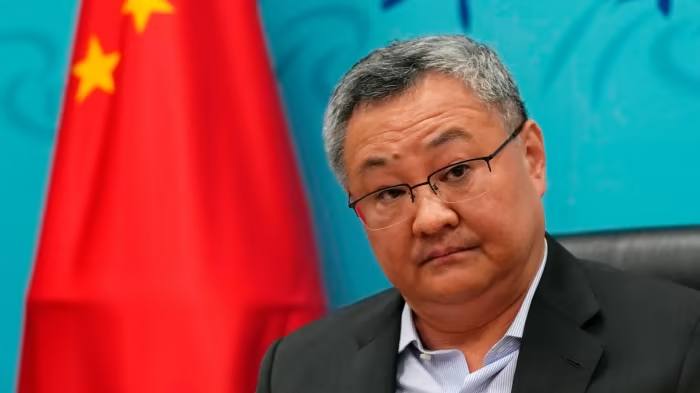
Good morning. This article is an on-site version of our FirstFT newsletter. Sign up to our Asia, Europe/Africa or Americas edition to get it sent straight to your inbox every weekday morning
We have two interviews today focusing on China’s escalating tensions with the west, ahead of trips to Beijing next week by several European leaders and as relations with the US have sunk to their lowest level since ties were normalised in 1979.
Speaking to the Financial Times in Brussels, Fu Cong, China’s ambassador to the EU, said Europe should reject Washington’s demands to curb trade with Beijing, warning any country that shredded business ties with his nation would do so “at their own peril”.
“Who in their right mind would abandon such a thriving market as big as China?” he said, claiming the US would “stop at nothing” to disrupt Europe’s ties with China. Fu also singled out the Netherlands for restricting exports of high-end chip technology to China and hinted Beijing could retaliate depending on the extent of the controls.
In its regional report released today, the World Bank warned that trade restrictions and tech decoupling posed a long-term threat to growth across Asia, as tensions hurt knowledge generation and innovation in both the US and China.
Aaditya Mattoo, the bank’s chief economist for east Asia and the Pacific, told the FT that other countries would struggle to exploit economies of scale if they had to comply with conflicting technology standards set by different governments.
“Once you move away from open, integrated markets which are governed by predictable trade rules to protectionism, trade division [and] politically influenced choices, you introduce uncertainty, which is to nobody’s advantage,” he said.
Their remarks come after European Commission president Ursula von der Leyen pledged yesterday to tighten scrutiny of trade and investment flows in sensitive technological areas and develop “new defensive tools” in the face of an increasingly assertive China. She will visit China next week with France’s Emmanuel Macron.
Two more reads I recommend on China and geopolitical tensions:
Here’s what else I’m watching today:
-
EU: The EU and France have flash consumer inflation figures for this month. Germany has retail and trade data for last month and labour statistics for this month.
-
UK: Britain reports gross domestic product for the fourth quarter and Nationwide publishes its house price index for this month.
As always, thank you for reading FirstFT and let us know if you have any feedback at firstft@ft.com. Have a great weekend.
Five more top stories

1. Donald Trump has been indicted following a years-long investigation by Manhattan prosecutors. The criminal charges are the first ever brought against a former US president. We have more details on the case involving alleged hush money paid to a porn actor.
-
Divided nation: Depending on who you asked, the indictment was an example of justice finally being served — or a politicised system harassing a single man.
-
Opinion: With the indictment, the US enters a deeply consequential struggle about whether it has a government of laws, or of men, writes Edward Luce.
2. The UK’s new net zero strategy will fail to cut emissions enough to hit its own legally enforceable targets, the government admitted yesterday as it published a raft of revised policies in response to a court ruling last year. Here’s how environmental experts and politicians responded.
3. Finland is now cleared to join Nato after Turkey’s parliament approved the Nordic country’s accession to the western military alliance. Neighbouring Sweden is still waiting for Turkey and Hungary to approve its bid.
4. Global dealmaking suffered its weakest start to the year in a decade, with the value of mergers and acquisitions dropping 45 per cent year on year to $550.5bn between January and March. Read more on how the chaos at banks has affected deals.
5. The flood of cash pouring into US money market funds could add to banking strains and is unlikely to stop soon, analysts and investors say. The vehicles, which invest largely in safe assets such as short-term government debt, have drawn in more than $340bn since the beginning of this month.
How well did you keep up with the news this week? Take our quiz.
The Big Read

Three American lenders have collapsed, and a fourth is still on the ropes. Billions have been wiped off the market valuation of banking stocks. After the recent failures of Silicon Valley Bank and other US regional banks, the FT has analysed more than 100 institutions to identify those that are the biggest cause for concern.
We’re also reading . . .
-
Boomerang CEOs: Disney’s Bob Iger, Starbucks’s Howard Schultz and now UBS’s Sergio Ermotti — in crisis, corporate boards turn to former leaders but the data suggests they shouldn’t.
-
2008 veteran: Colm Kelleher helped steer Morgan Stanley through the financial crisis. Now he hopes to do the same with UBS’s takeover of Credit Suisse.
-
Climate Exchange: David Craig, co-chair of the Taskforce on Nature-related Financial Disclosures, on how our economy is completely dependent on nature.
Chart of the day
With a sustained boom in spending power over the past decade, one might expect Americans to also live longer and healthier lives, writes John Burn-Murdoch. Yet the two trends are moving in opposite directions.

Take a break from the news
Roger Federer reunites with friend and comedian Trevor Noah to give an exclusive interview to the FT on the set of the tennis great’s latest film for Switzerland Tourism, in which they share advice on visiting the country, from Appenzell to Zurich, via cold-water swimming, train travel and skiing the Matterhorn — or not.
Additional contributions by Gordon Smith and Emily Goldberg
Thank you for reading and remember you can add FirstFT to myFT. You can also elect to receive a FirstFT push notification every morning on the app. Send your recommendations and feedback to firstft@ft.com





